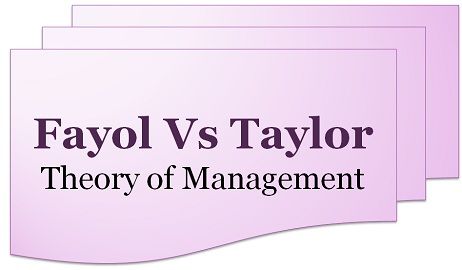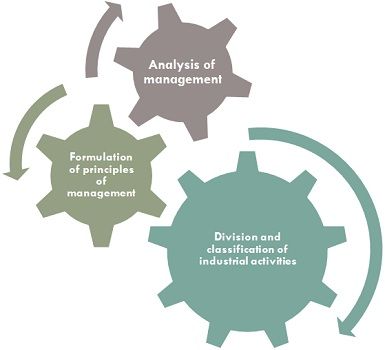 Henry Fayol is a French Mining Engineer, who developed the concept of general theory of administration and given 14 principles of management. On the other hand, F.W. Taylor is an American Mechanical Engineer, who advanced the concept of Scientific Management and given 4 Principles of Management.
Henry Fayol is a French Mining Engineer, who developed the concept of general theory of administration and given 14 principles of management. On the other hand, F.W. Taylor is an American Mechanical Engineer, who advanced the concept of Scientific Management and given 4 Principles of Management.
Management is viewed as the process in which the responsible members of the organization get the work done through and with others. Principles of Management are the guidelines that govern the decision making and behaviour in an organization. There are various theories of management which are put forth by a number of management thinkers. Two such management thinkers are Henry Fayol and Fredrick Winslow Taylor (F.W. Taylor).
In this article, you can find out the difference between Fayol and Taylor theory of management.
Content: Henry Fayol’s Theory Vs F.W. Taylor’s Theory
Comparison Chart
| Basis for Comparison | Henry Fayol | F.W. Taylor |
|---|---|---|
| Meaning | Henry Fayol, is a father of modern management who laid down fourteen principles of management, for improving overall administration. | F.W. Taylor, is a father of scientific management who introduced four principles of management, for increasing overall productivity. |
| Concept | General theory of administration | Scientific Management |
| Emphasis | Top level management | Low level management |
| Applicability | Universally applicable | Applies to specialized organizations only. |
| Basis of formation | Personal Experience | Observation and Experimentation |
| Orientation | Managerial function | Production and Engineering |
| System of Wage Payment | Sharing of profit with managers. | Differential Payment System |
| Approach | Manager's approach | Engineer's approach |
Definition of Henry Fayol’s Theory of Management
Henry Fayol, renowned as ‘father of modern management theory’, as he introduced comprehensive thinking on management philosophy. He put forward general management theory that applies to every organization equally and in every field. The principles of management laid down by Fayol are used by managers to coordinate the internal activities of the company.
To put into practice, the three components, i.e. division and classification of industrial activities, analysis of management and formulation of principles of management, Fayol promulgated fourteen principles of management, which are listed below:
- Division of Work: Work is divided into small tasks or jobs, which results in specialization.
- Authority and Responsibility: Authority implies the right to give the command and obtain obedience and responsibility is the sense of dutifulness, that arises out of authority.
- Discipline: Discipline refers to obedience to organizational rules and the terms of employment. It is to ensure compliance and respect for seniors.
- Unity of Command: An employee will receive orders from one boss only.
- Unity of Direction: All the organizational units should work for the same objectives through coordinated efforts.
- Subordination: Individual or group interest are sacrificed or surrendered for general interest.
- Remuneration: Fair and satisfactory payment for both employer and employee.
- Centralization: There must be the optimum utilization of organization’s resources.
- Scalar Chain: Scalar chain implies the superior-subordinate relation, within the organization.
- Order: In an organization, there must be a proper place for every thing as well as each thing must be in its appointed place.
- Equity: Sense of equity should exist at all the levels of the organization.
- Stability of tenure of Personnel: Efforts are to be made to reduce employee turnover.
- Initiative: It implies thinking out and implementation of the plan.
- Esprit de Corps: It stresses on the need of team work in the organization.
Video: 14 Principles of Management
Definition of F.W. Taylor’s Theory of Management
Fredrick Winslow Taylor, or F.W. Taylor popularly known as ‘father of scientific management’ who with the help of experiments proved that scientific methodology could be applied to management. A scientific process comprises of observations, experiments, analysis and inferences, which Taylor wants to apply in management to develop a cause and effect relationship.
Taylor’s primary concern was management at the supervisory level and gave much stress on the efficiency of workers and managers at an operational level. Scientific Management is just a mental revolution for both employer and employees, which consist of the following principles:
- Science, not the rule of thumb: To improve the performance level, the rule of thumb is replaced by science.
- Harmony, not discord: There must be a coordination of the activities of the employees and not discord.
- Cooperation, not individualism: There should be an environment of cooperation in the organization, of mutual interest.
- Development of every person to his greatest efficiency: Motivation is to be provided to greatest efficiency to every member of the organization.
Video: Principles of Scientific Management
Key Differences Between Fayol and Taylor’s Theory of Management
The difference between Fayol and Taylor’s Theory of Management, are explained in the points presented below:
- Henry Fayol is a father of modern management who enunciated fourteen principles of management, for improving overall administration. As against, F.W. Taylor is a father of scientific management who developed four principles of management, for increasing overall productivity.
- Henry Fayol introduced the concept of General theory of administration. F.W. Taylor laid down the concept of Scientific Management.
- Henry Fayol emphasized the working of top level management, whereas F.W. Taylor stressed on the working of production level management.
- Fayol’s management theory has universal applicability. Unlike Taylor, whose management theory applies to a number of organizations only.
- The basis of formation of Fayol’s theory is the personal experience. Conversely, Taylor’s principles rely on observation and experimentation.
- Fayol is oriented towards managerial function. On the contrary, Taylor focussed on production and engineering.
- The system of wage payment determined by Taylor is differential piece rate system, while Fayol stressed on sharing of profits with managers.
- The approach of Taylor is termed as Engineer’s approach. In contrast, Fayol’s approach is accepted as manager’s approach.
Conclusion
Both the management thinkers have an immense contribution in the field of management, which is not contradictory but complementary in nature. While Henry Fayol is an ardent proponent of the unity of command, F.W. Taylor is of the opinion that it is not substantial that under functional foremanship, an employee receives orders from multiple bosses.







michael says
This article is helpful and i need more knowledge about management from this source
Thanks
Mk star says
Very helpful for me
Abraham says
this information has being helpful in my critical essay but i need the name of the author please for the reference. I will be glad if i can have it soonest. thanks
Surbhi S says
The author is Surbhi S.
ayomide says
This information helped me a lot
Neil says
Very simple words were used, and it helped me a lot.